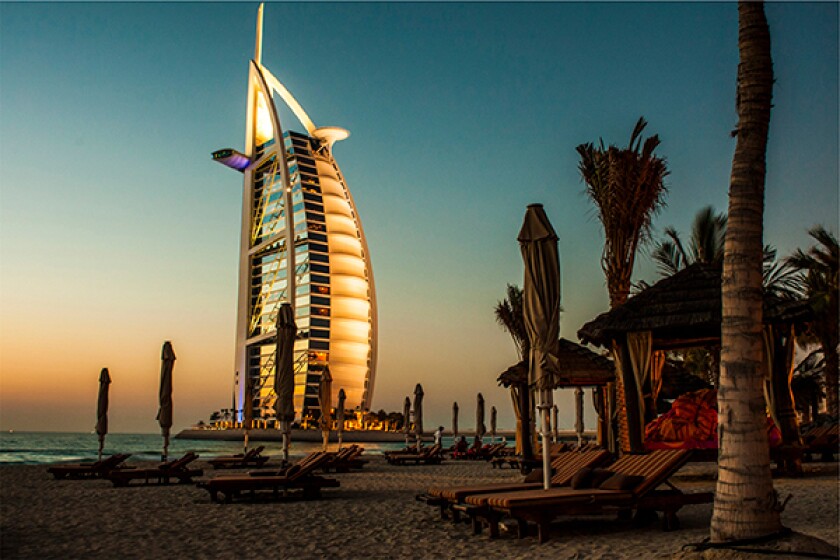SECTION 1: Market outlook
1.1 How would you summarise your jurisdiction's attitude towards the influence of Japanese corporate culture in its industries?
Japanese companies find it challenging to introduce Japanese corporate culture–typified by overtime, limited vacations, and careful attention to detail in all activities at work–to commercial and industrial workplaces in the UAE.
Specifically, the UAE does not have a culture of overtime and many employees expect to take up to a month of paid vacation at a time per year. The labour law promotes both limited overtime and 30 days of annual paid vacation. There is also little emphasis in the work culture placed on the importance of attention to detail. However, Japanese companies that are more flexible with their workforce can be successful in the local business environment.
The UAE is unique in that foreign nationals make up more than 99% of employees in the private sector. Japanese companies must be ready to manage a diverse workforce often made up of employees from the Middle East, South Asia, Southeast Asia and beyond. For this purpose, a detailed set of work rules and regulations is important for employees to have a common understanding with management.
1.2 What is the outlook for Japanese investment into your jurisdiction over the next 12 months?
The UAE is a federation of seven Emirates. Of these, Dubai is the commercial capital that is a hub for the Middle East region, whereas Abu Dhabi is the seat of the federal government and the source of the country's oil and gas wealth. About 300 Japanese companies have a presence in Dubai, making it the largest focus for Japanese business in the Middle East and Africa region. About 70 Japanese companies have a presence in Abu Dhabi, focused primarily on work carried out in Abu Dhabi. The other five Northern Emirates (Sharjah, Ras Al Khaimah, Fujairah, Ajman and Umm Al Quwain) account for less than ten percent of the territory of the UAE, and a few Japanese companies have trading or manufacturing facilities, notably in the two Emirates of Ras Al Khaimah and Sharjah.
Dubai will continue to be the favored city for Japanese multinational companies to establish a regional hub for the Middle East. Some Japanese companies based in Dubai cover more than 80 countries across the Middle East, Africa, Southwest Asia and Central Asia.
Abu Dhabi, with the dominance of a longstanding oil and gas economy, is less likely to see new entrants from Japan, unless there is a company engaged in a specific contract or project in Abu Dhabi.
Some Japanese companies consider the Northern Emirates for establishment of comparatively low-cost manufacturing facilities.
SECTION 2: Approving foreign investments
2.1 Explain the foreign investment approval process and approval timetable.
In a free zone, approval of a foreign direct investment is straightforward. The application is generally made only towards that free zone authority and other approvals are typically not required (except for certain federal approvals for specific sectors listed in 2.4).
Despite the small territory and population of Dubai, with approximately two million people, the city has more than 30 free zones, each of which is its own jurisdiction that follows its own rules for business establishment and operation. There is then onshore (non-free zone) which follows the local procedures.
A company registered in a free zone cannot carry out business outside of that free zone.
Free zones are generally free of foreign investment restrictions. Like the UAE mainland, they are also subject to no corporate tax and limited restrictions on the hiring of foreign nationals. Most Japanese companies in a Dubai free zone are established in either the Jebel Ali Free Zone (JAFZ), which surrounds the Jebel Ali Port, or the Dubai Airport Free Zone (DAFZ), which is adjacent to the Dubai International Airport.
A free zone company cannot carry out commercial activity on the mainland UAE. To operate on the mainland UAE, a company must establish an onshore presence, as either a branch of a foreign company, or an LLC. Japanese companies in the engineering and construction sectors, logistics, or retail sales sectors often establish an LLC, which is subject to a maximum of 49% foreign ownership, requiring a UAE national to hold at least 51% of the share capital.
Outside the free zone, an investor will apply to set up a company through the Ministry of Economy (in the case of a branch of a foreign company) or the Department of Economic Development (in the case of an LLC), and the approval is largely procedural, subject to the blanket foreign investment restriction that is typically capped at 49%.
2.2 Are there any investment restrictions in specially regulated sectors and is the government entitled to any special rights in these sectors?
Outside the free zones, the standard cap on foreign investment is a maximum of 49%, requiring at least 51% local ownership.
There are essentially no foreign investment restrictions inside the free zones except in federally regulated areas such as banking, finance, telecommunications, pharmaceuticals and media.
In banking and finance, where approval of the UAE Central Bank is required, foreign shareholding is capped at a maximum of 40% of the ordinary share capital.
For insurance companies, there is a maximum cap of 25% foreign investment.
Foreign investment is prohibited in some sectors such as manpower services and real estate brokerage.
Natural resources are developed pursuant to concessions awarded by the Emirate governments. Many of these concessions are only awarded to foreign companies with proven capabilities in the sector.
Many foreign companies are active in the telecommunications sector providing equipment or constructing facilities, but only two local national companies, operating as the brands Etisalat and Du, are licensed as telecommunications companies.
2.3 Which authority oversees competition clearance? Please give a brief overview of the merger clearance process.
A competition law was introduced in 2012, but there is not yet a robust system in place by which foreign investment is scrutinised for anti-competitive impact. Mergers and foreign investments are generally not subject to competition clearance applications.
2.4 Are there further approval requirements that foreign investors should be aware of?
Any company, regardless of how much foreign direct investment is in the company, must obtain prior regulatory approval to establish a business in certain commercial sectors. The approvals are typically linked to the company's ability to meet the regulatory requirements of operating the business.
At the federal level, required regulatory approvals include:
approval from the UAE Central Bank for any banking of finance business outside of the Dubai International Financial Centre (DIFC) free zone;
approval of the Securities and Commodities Authority (SCA) for financial analysis, financial consultancy, and brokerage in shares and bonds;
approval of the UAE Insurance Authority for any insurance company, broker or agent;
approval by the Telecommunications Regulatory Authority (TRA) for the import or sale of telecommunication equipment;
approval of the Ministry of Health for sales or manufacture of pharmaceuticals or cosmetics;
approval of the National Media Council for all media, publication, printing, advertising, filming, broadcasting and art production.
At the Emirate level, local regulatory approvals are required for companies doing business in sectors that include education, tourism, hospitality, food processing, food service, personal security, healthcare, real estate brokerage, oil exploration and development, taxi and transport services, construction contacting, and engineering consultancy. The competent agency or department will differ from Emirate to Emirate.
SECTION 3: Investment techniques
3.1 What are the most common legal entities used for Japanese investment in your jurisdiction?
A Japanese company setting up in the UAE will typically establish:
In Dubai and the Northern Emirates, where there are more than 300 Japanese companies, it is most common to establish a free zone company in one of the many free zones. The entities differ by free zone and the common entities include a free zone establishment (FZE), a free zone company (FZCO) and a free zone LLC (FZ-LLC).
In Abu Dhabi, where free zones are limited, it is most common to establish a branch of a foreign company, which is how more than 90% of the Japanese companies in Abu Dhabi operate. There are no foreign capital restrictions for the registration of a branch, but a UAE local national or a company wholly-owned by a UAE national must act as the local service agent (or sponsor) of the branch office.
Companies active in construction, engineering, retail sales, trading, or transport must have a presence onshore and not within the free zones. This is most commonly an LLC established pursuant to the UAE Commercial Companies Law. At least 51% of the shares in an LLC must be held by a UAE national or the wholly-owned company of a UAE national.
Importantly, there are nominee arrangements by which a foreign investor can control management of an onshore company without the active participation from the local shareholder, and by which the local shareholder is paid a simple fee. However, a UAE shareholder cannot irrevocably transfer their rights to the foreign shareholder, and nominee arrangements must be carefully structured to not violate requirements of law that prohibit restricting the rights of such local shareholders.
3.2 What are the key requirements for establishment and operation of these legal entities?
The process is laborious but not difficult when handled by professional advisors.
First, a preliminary application is submitted to reserve the company name and other key details with the applicable authority (free zone authority or Department of Economic Development or Ministry of Economy).
As to documentation, a Japanese company will have to create an English translation of its teikan (articles of association) and tokibo tohon (corporate registration), and pass a resolution authorising the establishment or share acquisition that appoints a local representative to represent the company in the UAE for the company registration process. As the UAE has not signed the Hague Apostille Convention, these documents must be notarised in Japan, approved with Japan's Ministry of Foreign Affairs, and then authenticated with the UAE Embassy in Shibuya, Tokyo.
The documents are then sent to the UAE where they are further authenticated and Arabic translations are issued by a licensed legal translator.
The articles of association of a new company are then notarised at a local notary public and submitted to the Department of Economic Development, or for a free zone, signed and submitted to the free zone authority. For an onshore LLC, several protections and controls may be entrenched in the UAE company's constitutional documents such as rights to appoint all members of the board, veto rights over key matters, and enhanced dividend rights (such as 80% of the profits being distributable to the foreign 49% shareholder). It is also desirable to sign a shareholder agreement with the local partner.
The company must also lease an office prior to completing the incorporation process. Companies cannot be established without a physical office and a mere address is not enough for registration.
When these documents are submitted, the new company is established, and a commercial licence stating the company's permitted commercial activities is issued as proof of incorporation.
Post-incorporation tasks include the opening of a bank account and registration of a post office box.
SECTION 4: Dispute resolution
4.1 How effective are local courts' enforcement and dispute resolution proceedings, and what should Japanese investors be particularly aware of?
The law regarding civil procedures is universal across the UAE, but five Emirates, including Abu Dhabi, opt into a federal court system, whereas Dubai and the Emirate of Ras Al Khaimah operate their own court system. Courts are divided into First Instance Courts, Appeal Courts, and the Court of Cassation or Supreme Court.
Courts in the UAE mainland follow a civil law system and are heavily based on written pleadings in the Arabic language. Outside experts and auditors play an important role in the litigation process.
Courts in Dubai are generally perceived to be fair to foreign investors and do not specifically favour local interests.
The DIFC has its own common law courts which can be agreed as the courts of jurisdiction for some commercial contracts signed inside and outside the DIFC.
4.2 Does your jurisdiction have a bilateral investment protection treaty with Japan and is that commonly used by investors?
There is no bilateral investment treaty between the UAE and Japan.
4.3 Do local courts respect foreign judgments and are international arbitration awards enforceable?
Foreign arbitral awards are enforceable pursuant to several international treaties, most notably the New York Convention that the UAE ratified in 2006.
Foreign judgments may be enforced where all the following conditions are met:
UAE courts do not have jurisdiction in the dispute in which the judgment has been given or the order made;
the foreign courts had jurisdiction;
the opposing parties in the case in which the judgment was given were summoned to appear and duly appeared;
the judgment is final and not subject to appeal;
it does not conflict with a judgment or order previously issued by a court in the UAE;
the judgment is not in breach of public morals or public order in the UAE.
SECTION 5: Forex controls and local operations
5.1 What foreign currency or exchange restrictions should foreign investors be aware of?
There are no foreign currency restrictions.
The UAE dirham (AED) is pegged to the US dollar at a rate of $1 = AED3.673.
SECTION 6: Tax implications
6.1 Are there tax structures and/or favourable intermediary tax jurisdictions that are particularly useful for Japanese investors into the country?
The UAE is designated as a tax haven under Japan's tax laws. However, following recent liberalisation of Japan's tax laws, Japan tax advisors generally no longer recommend the structuring a major investment from Japan into the UAE through the Netherlands (although this was previously one preferred option).
6.2 What are the applicable rates of corporate tax and withholding tax on dividends?
Except for the oil and gas production sector and the UAE branch offices of foreign banks, there is presently no corporate tax in the UAE. There are also no withholding taxes.
A shareholder resolution is typically required to approve a dividend or profit distribution. Companies established in the free zones must often submit written proof of the resolution to the free zone authority, and banks may request proof of these submissions before they will remit a dividend.
A new five percent value-added tax is proposed to be introduced from January 1 2018.
6.3 Does the government have any tax incentive schemes in place?
There are no government tax incentives as there is presently no corporate tax in the UAE nor any withholding taxes.
The most notable government incentive is for the industrial sector, where a company with an industrial licence may receive an exemption of payment of the five percent import duty on raw materials.
6.4 Are there any reciprocal tax arrangements between your jurisdiction and Japan? If so, how can they aid investors?
There is a tax treaty between Japan and the UAE, but this has little impact on Japanese investment into the UAE, and the primary beneficiary of the treaty is the UAE's two international airlines.
About the author |
||

|
|
Christopher Gunson Partner, Amereller Dubai, UAE T: 971 50 554 6205 Christopher Gunson is a partner of Amereller, based in the firm's Dubai office. He has been based in the Middle East since 2009. Gunson is fluent in Japanese and much of his practice involves representing and advising more than 100 Japanese multinational companies on matters in the Middle East region. This work includes commercial transactions such as agency and distributor agreements, strategic investments and joint ventures, regulatory compliance, and employment matters. He is a regular speaker in Japanese on Middle East business law matters in Japan and has spoken at events sponsored by JETRO, JCCME, SMBC and JOI. In addition to his corporate and commercial work, Gunson conducts substantial work in the oil and gas sector and he is a frequent author and commentator in news media concerning developments in the oil and gas sector in Abu Dhabi, Iraq and Iran. |
About the author |
||

|
|
Akiko Abe Legal manager, Amereller Dubai, UAE T: 971 4 432 3671 Akiko Abe is a legal manager with more than 15 years of experience working in international law firms. She has been in the UAE since 2012 and supports Japanese and multinational companies on legal and administrative aspects of their business. Abe has taken an active role in project management on a number of complex finance transactions, especially on due diligence and deal closing. Abe has a LLB from Aoyama Gakuin University, a BA from Campbell University, and a LLM from Temple University Beasley School of Law. She is not admitted in any jurisdiction and works under the supervision of the firm's lawyers. |
Click image below to download the Japanese version of this article

